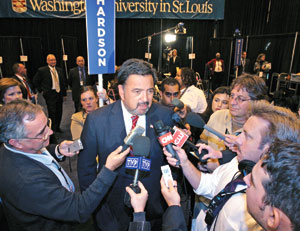Against a backdrop of political theater, the dramatic question-and-answer session between Sen. Joseph Biden and Gov. Sarah Palin was just the first act. Act II, with its assorted cast of characters, was staged around the corner from the debate hall in the Media Filing Center.
The cavernous space, usually a recreational gymnasium, held 70 40-inch flat-screen TVs at long, skirted tables the length and width of one side of the room. Thirty pipe-and-draped mock radio and TV stages lined the length of the other. In between the black-box theater-style setting was open space waiting to be filled.

During the debate, hundreds of reporters, writers and bloggers sat transfixed at the flat screens, watching the candidates make their cases. The calm in the room belied the impending frenzy.
No sooner had the candidates congratulated one another and introduced their families than the area — the open space waiting to be filled — transformed into what is known as “Spin Alley.” As the campaigns’ political surrogates burst onto the scene, a spectacle ensued.
Throngs of reporters circled such notables as Sen. John McCain supporter Rudy Giuliani, former mayor of New York City, and David Axelrod, Sen. Barack Obama’s chief strategist.
Others clamored for opportunities to ask questions of such McCain surrogates as Sens. Lindsey Graham and Joseph Lieberman and former senator Fred Thompson, or Obama spokespersons Sen. Claire McCaskill and David Plouffe, Obama’s campaign manager.
Frank Donatelli, the deputy chairman of the Republican National Committee, and Bill Richardson, Democratic governor of New Mexico, also flanked the “stage” to give their analyses. In order to spot the stand-ins among the masses, assistants held personalized campaign signs aloft indicating each surrogate’s whereabouts.
Giuliani darted from reporters to cable news shows and back. His take on Palin’s performance was glowing.
“She handled herself brilliantly tonight,” Giuliani said. “She did a much better job than Joe Biden, and Biden’s been doing this for 30 years. I know the liberal media will try to take it away from her, but I think the American people understand who won this debate tonight.”
At stage left, a reporter asked Plouffe if Palin demonstrated the readiness to be president. “We’ll leave that to the voters,” he said. “I don’t think she demonstrated a compelling case for change. I think if you’re a middle-class voter, you have no idea what McCain and Palin are going to do differently than what George Bush is doing.”
At the room’s center, perhaps by intention, WUSTL faculty experts gave more objective comments. Taking questions were Wayne Fields, Ph.D., the Lynne Cooper Harvey Distinguished Professor of English and American Culture Studies; William Lowry, Ph.D., professor of political science in Arts & Sciences; Gregory Magarian, J.D., professor of law; Timothy McBride, Ph.D., associate dean for Public Health; and Steven Smith, Ph.D., the Kate M. Gregg Professor of Social Sciences in Arts & Sciences and director of the Murray Weidenbaum Center on the Economy, Government and Public Policy.
According to Smith, the debate was a success for both candidates. He said Palin was a fighter and that she framed issues.
“I think Gov. Palin managed to recover some of the position she lost over the last two to three weeks,” Smith said. “In general, she framed issues to her own advantage. While she stumbled now and then, by and large she did a pretty good job.”
Of her opponent, Smith said he did not think Biden gave his best performance, saying that Biden’s speaking styles didn’t show enough change of pace, and that this made him hard to listen to at times.
Yet “I think no one would come away from listening to him with anything other than the conclusion that he is an experienced policymaker and certainly someone who’s capable of handling the job of vice president,” Smith said.
Lowry was like-minded. He said Palin held her own, but that Biden was often more substantive in his answers.
“She has a tendency to use certain mannerisms in order to be engaging to the audience, which might play better to some parts than others,” Lowry said. “But she does that very effectively.”
Overall, though, Lowry said both played well to their base and neither would sway many voters.
And Smith noted the irony between the debate’s massive buildup versus its outcome. Despite all the anticipation and talk about how this would be the most important vice presidential debate in history, he said that it probably would not be.
“It had the potential for a big gain or big loss for the candidates, but it turned out probably to help stem the bleeding (in McCain-Palin’s case), and that’s about it,” Smith said. “We’ll discuss this for about 48 hours, and then the focus will turn to what the presidential candidates will say in their next debate.”
Smith said that the rapid sequence of events is going to make it difficult for this debate, given how it turned out, to have a lasting effect.
One thing is certain about the only vice presidential debate, however: As journalists asked their last questions, wrote their last columns and broadcast their last programs of the night — and as the last lights dimmed on “Spin Alley” — the drama of the election season continues.